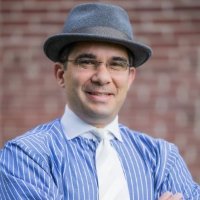MOV Interview: SEV MENESHIAN

VISIT http://www.publicretirementplanners.com/
Sev Meneshian is a very successful financial planner in Chicago, “I’m a Certified Financial Planner™ practitioner and an investment adviser. My area of focus includes helping clients (who are mainly from the public sector), with comprehensive financial planning. This means I help clients plan for their retirement, reduce their tax burden, cut their exposure to long-term care costs, and leaving a legacy for the kids, grandchildren, or favorite charities.”
Helping people fulfill their dreams in an organized and sensible way is more important in today’s chaotic world than perhaps ever before: “Do they have their estate-planning documents lined up? If something happens to them, will their wife, or husband, or family member be able to make medical decisions and financial decisions for them? Are their investments lined up in such a way that they’ll be able to meet their retirement dreams and goals? We offer help in all kinds of ways because financial security and lifestyle decisions are very closely related and interconnected.”
 Meneshian defines freedom as being able to pursue their one’s dreams in the best way possible, but he emphasizes that this pursuit should reflect important values. “Number one for me is being direct with people, being open and honest. I have to spend a good deal of time with the family to really understand how to best help them. I value internal strength which to me means having a deep faith in God and things that they feel strongly about which has to include not harming anyone else. I take a very bottom-line approach to things, and especially my life. In most cases, just from observation 99% of the time, we are what we are because of choices that we made yesterday, last year, 10 years ago, and 20 years ago, and possibly even beyond. I really try to be open and honest, especially with my wife. The nice thing is I don’t have to watch what I’m saying, or I should say I don’t have to think before I speak in the sense that I don’t hold any secrets from her. And I think that honesty also means you need to speak up when it’s appropriate. A lot of people condone implied lying or lying by omission where, for example you don’t discuss something in front of certain family members or people because someone doen’t want them to know or want them to know that you know. I think that’s a form of dishonesty.”
Meneshian defines freedom as being able to pursue their one’s dreams in the best way possible, but he emphasizes that this pursuit should reflect important values. “Number one for me is being direct with people, being open and honest. I have to spend a good deal of time with the family to really understand how to best help them. I value internal strength which to me means having a deep faith in God and things that they feel strongly about which has to include not harming anyone else. I take a very bottom-line approach to things, and especially my life. In most cases, just from observation 99% of the time, we are what we are because of choices that we made yesterday, last year, 10 years ago, and 20 years ago, and possibly even beyond. I really try to be open and honest, especially with my wife. The nice thing is I don’t have to watch what I’m saying, or I should say I don’t have to think before I speak in the sense that I don’t hold any secrets from her. And I think that honesty also means you need to speak up when it’s appropriate. A lot of people condone implied lying or lying by omission where, for example you don’t discuss something in front of certain family members or people because someone doen’t want them to know or want them to know that you know. I think that’s a form of dishonesty.”
As anyone who works in the modern business world knows, that kind of honesty can cost you money, but Sev Meneshian sees it as an essential part of his vocation. “I am licensed as an investment adviser, which means I’m a fiduciary, so I have a duty of loyalty and care that’s owed to my clients and then legally I’m bound to put my client’s interests ahead of mine. An investment adviser is different than a financial advisor. If I was just a registered representative and I was commission-based, I may be tempted to convince a client to move their money into something that would pay me a bigger commission, as long as that investment was suitable for them. But, I don’t operate under the suitability standard; I operate under the fiduciary standard. There’s no personal advantage or gain for me to advise them one way or another so I can really be objective.”
As a man who follows a true system of values, Meneshian earns his money over the long term with most clients. “If a client is with me for five, ten, or fifteen years, I would eventually earn more income than I would if I was just selling them stock as a broker, but the thing is I’m giving consistent service whereas the salesman who is just selling a commissioned product is looking more at the upfront money. The good ones, once in awhile, they’ll advise, but the ones that don’t have the values that we’re talking about, they could disappear and a lot of them do. That’s a big thing with clients is that they come over, because they get neglected once the sale is made.”
Meneshian draws inspiration from many sources but books and quotes from people he admires are the leading sources. “Just this past weekend we were at a friend’s cabin and I just happened to crack open a book that he had up there, and it had some great quotes concerning dealing with success and overcoming obstacles that I actually took pictures of so I could remember them, nut great advice is great advice and it can come from anywhere, One of my favorite all-time movies is The Godfather. I’m actually listening to the audio version of that book right now. As awful of a person as Vito Corleone was as a mob boss, there was a lot of things he said in the movie that were admirable. Things like saying, “A real man spends time with his family.” He’s teaching and coaching his sons. . Although he’s guiding his son to take over the reign of a criminal organization, he’s still giving him life lessons.
Like many people, Sev Meneshian is concerned about the future of America. “Being a money manager, what worries me is this huge, huge national debt we’ve created; twenty trillion dollars, and that’s not to mention the unfunded liabilities like Medicare and Social Security. Whether you are looking at the debt of a household or the debt of nation, these are issues that that have to be repaid, one way or another. I think building up this kind of debt is another consequence of the moral decay that been growing in our nation for many years. You can even see it in pop culture. Look at the movies for the last thirty years and I’m only forty years of age. Art is a reflection of life, and the movies have gotten increasingly violent, which is an issue because movies have the most impact on younger people or perhaps even more impact on people maybe who have psychological or mental issues. I can watch violent movie all day, and I don’t think I will become a violent person, but somebody who is maybe in that direction may carry out those the things that they watch.”
Another issue that Meneshain identifies as contributing to the decline of America is excess. “We are obsessed with accumulating things. It’s too easy to get credit and the real wealth is being concentrated relatively the hands of a few. If it’s earned the right way, then that’s perfectly fine. I know that there are cycles to everything, but we’re not the egalitarian society that we were sixty years ago, where you had one parent working, typically the father while the mother stayed home with the kids and made sure they were taken care of, and from what I can gather, people were happier back then. The Great Depression was a terrible time for a lot of families, but families were a lot closer then because they had to rely on each other a lot more. You didn’t have the wealth, but you had the closeness in the family. Now you have the wealth, but with a lot of families, you don’t have the closeness.”
“For example, I’m a capitalist to my bones,” Meneshain continues, but there has to be reasonable limits to what a person or a company can do to make money. You can’t dump toxic chemicals into the local waters and start poisoning the water and the land. There has to be a limit. Who imposes those limits ultimately in our country? It’s the government, but you can have corruption in government as well”
The conflict, of course, comes in the area of maximizing profits. “The job of a corporation is to make money for its investors,” Meneshian added. “But the limits a company will got to depends on their moral compass and that comes from the top, the people who run the company. We tend to only hear about the ones who violates people’s rights in the name of making money, but there are a lot of corporations that have a strong moral compass as well. If the person at the top has very strong moral compass he or she will try to do things the right way. A lot of businesses, however, operate in a kind of gray area of morality just to survive. That’s also part of it. If they do things in a humane way, it might force them to close and then everyone is going to be out of a job. The ideal is to never do anything that violates the rights of others so you don’t become dependent on operating that way. I used to have this discussion with my father back in the steroid era of baseball. I’d say, ‘Hey, look, if someone had the talent to be in Triple A and on the verge of making it to the majors, but just needed a little more kick to get that big payday, it would be very difficult to resist that temptation.’ If that means making three million bucks next year instead of just being a regular Triple A guy, that’s obviously something a lot of guys think about.”
Part of what Meneshian is saying is that often corporations or individuals will turn to dishonor-able practices out of a survival instinct. “That survival instinct kicks in and it’s a powerful force. I think that if you’re on the verge of getting fired or even think you might get fired, you tend to do what you have to do to keep your job. You think, ‘Oh my gosh, I can’t pay the house, so where am I going to live? I cannot afford food. I’m not going to be able to do this or that.” Those are real survival instincts that kick in, and once you get over that initial feeling, then some kind of sanity is reached, then you’ll understand that it’s not the end of the world. We’re just hardwired to survive.”
It all comes down to where we draw the line. Does our survival instinct kick in when we fear we might lose our house or does it kick in when we fear we won’t be able to but the latest i-phone or this year’s Porsche. We set the limits. Sev Meneshian is a person who recognizes the value of honesty and ethical behavior. That is one of the reasons he is a Man of Value.
___




No Comment